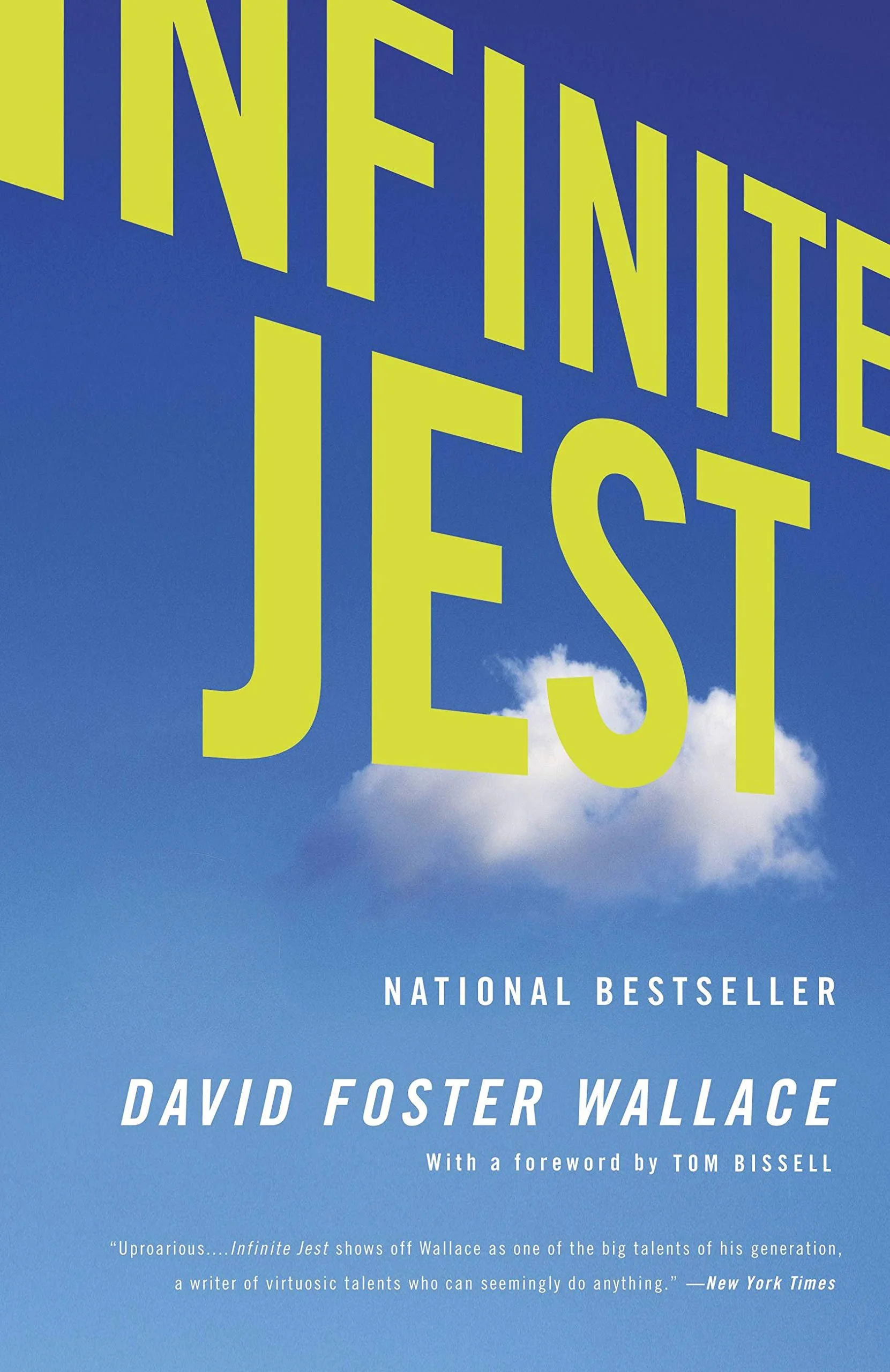Book Review : David Foster Wallace - Infinite Jest (1996)

I have read Infinite Jest in sixteen days. That's an average of 67,4 pages a day, which sounds about right. Not always though, it's an average. The least pages I have read in one day is seventeen and the most is a hundred and thirty. You don't care about my reading stats, but you don't understand. There is no way one can effectively review Infinite Jest in less than ten thousand words without leaving himself out of the portrait and no way I'm going to write ten thousand words for a stand-alone post on this blog. Too long.
I had been waiting for a year to read David Foster Wallace's magnum opus because I know how time and energy consuming a thousand-pager can be and I didn't want to miss my window with this one. It's been a life-changing experience for so many people, so I was really curious what the mystique around it was. Did it change my life? No. Did it sweep me off my feet? Not really. But I'll admit it changed a lot of things about my perception of reading, writing and gave me a slightly better understanding of my own life.
I'm not going to even pretend to resume the storylines to you. What you have to know is that there're three of them. There's a tennis academy for young prodigies where everybody is neurotic and anesthetizing their feelings with drugs, a halfway house where the lost souls meet and try to get better with the help of each other and a terrorist faction seeking the independence of Quebec. The best way I can picture how the three storylines are brought together is to imagine a braid. The three segments are gradually brought together to form a single object, but they never become one. Infinite Jest is always three stories and never one. There are maybe over a hundred characters who come and go and it's up to you, who do you want to attach yourself to. Personally, I reached out the most to Rémy Marathe, the wheelchair-bound terrorist with an ethical dilemma, the well-meaning Don Gately and to Kate Gompert.
What you have to know about Infinite Jest before reading it (that I didn't know myself) is that it's constantly changing rhythms. Sometimes in between chapters, sometimes in between paragraphs and sometimes from a sentence to another. That's very difficult on a reader because you cannot blindly invest yourself in a character. Once you start an emotional connection with one of them, (s)he disappears for three hundred pages and in-between you fill have other storylines and other characters to care about. That's an exercise in ADHD in itself and the main reason why I had difficulty wrapping my mind around Infinite Jest and letting myself go. That exposed a truth about my reading habit I didn't entirely understand up until now. I am a creature of habit and I need structure and flow to abandon myself. Like in music, I have a love for what masters clear structures, but not for what plays out of them. When I accept to invest myself in a character, robbing him(her) from me will piss me off more than anything.
While the halfway house segments and the dialog in between Rémy Marathe and Helen Steeply got me charmed, the Tennis Academy segments left me puzzled more often than not. I thought it was supposed to be organized around the Incandeza family (without spoiling anything, I can tell you they are a big part of the link in between Infinite Jest and Hamlet), but Wallace spends an ungodly amount of time discussing tennis and a bunch of neurotic, competitive kids without much development. Maybe there's a layer of symbolism I didn't understand or maybe I just don't "get" tennis enough to see the aesthetic beauty behind these segments, but they felt long, bloated and wordy to me.
But enough with that...
The question that is presently on your lips right now is: "Should I read Infinite Jest? If so, why and how?" It's a valid question. I think that if you're into literary fiction you won't regret investing time in Infinite Jest like I did. Should you cruise through it in a little more than two week like me? No, I don't think it's meant to be read like that. Read it slowly. As slowly as you can and as soon as your focus gives up on you, stop. It's like whiskey. A glass or two will be enjoyable, but drink a whole bottle and you'll get sick. As far as being an aesthetic pleasure, Infinite Jest is way above average. Wallace has a knack for killer dialog and to create difficult characters who grow on you with time and effort. Kate Gompert, who seems damaged beyond repair in the beginning, kept growing on me throughout the pages and by the end I was rewarded for believing in her. That's one of the ultimate achievement of fiction right there. Separating you from yourself and fighting alongside somebody else until words run out. It's especially spectacular when a writer can make you believe in somebody you don't want to be and drags you towards complete empathy.
Yes, you should read Infinite Jest. You should battle the multiple hardships it causes and stick with the characters because they all have a treasure to offer you. It's not going to be easy, but take your time and don't give up on them. I labored over some parts, sure. Could it have been shorter? Probably by a few hundred pages. Was it worth the headaches and the fight? Yes. Infinite Jest didn't change my life, but it changed a few things and got my gears spinning.

